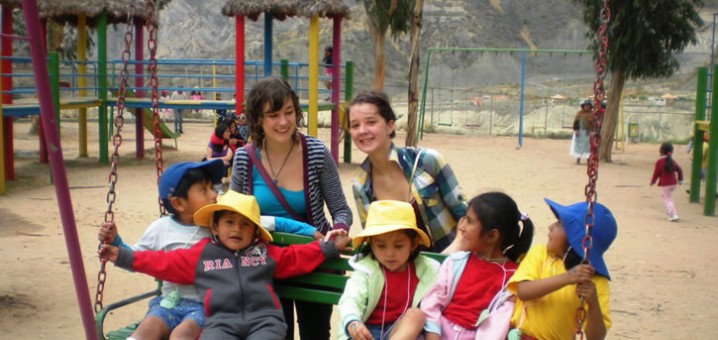Volunteer at children’s center in Bolivia (part II)

This article is the second part of the interview with Emma, one of the founders of the childcare center in Bolivia ( the first part is here.
Emma tells about her experiences and the impact the project and the volunteers have on the local community in Bolivia and how volunteers are needed here.
Can you describe what your overall experience is with volunteers?
We notice that the first week can often be overwhelming for the new volunteers. The children are all asking for your attention and almost no one of the local people speaks English . After two weeks or so, the volunteers are feeling more at home, they understand how everything works, the routines and activities. What also gives them a positive feeling is that they start to realize that the volunteer work they are doing is very helpful. For us it is important that they stay at least one month or longer, because too many change of faces will not have a good effect on the children. But, many of our volunteers decide to extend their stay. We are very often inspired and moved by our volunteers, and we really appreciate it that they are willing to share their time and talents with us. Their presence really creates true benefits for us and also for them. They do great work in our childcare center and they can improve their Spanish language skills while volunteering here in Bolivia.

How do you see the future of the project? Is there an ultimate goal you are aiming to reach?
Our ultimate goal is to give the children the chance to reach their potential in their community, and promote and support them in their rights to do get and keep this potential. We would really like our nursery to grow and also start after-school activities. This would be for the children of 5 year and older, who are going to school instead of our center. They still have the same risks as the other children, because school finishes at midday and for some children there is still an empty home waiting for them when they come home after school. Also, they do not get help with their school work. A risk for our center is the fact that the work in the center is very exhausting for the local women, because they work with many children every day. If they getting sick or becoming exhausted, we will not have other teachers to replace them. This is why we are aiming to create more activities and excursions outside the classrooms. This is good for the children but also for the mothers, teachers and volunteers. These activities include for example yoga, art classes and dance or aerobics lessons. Also volunteers take a part of the pressure these women feel of taking care of so many children.

What can you say about the social implications of volunteering in Bolivia, for example to explain this to a irresolute volunteer?
Volunteering gives you a completely different perspective of getting to know a country, you can get an insight in the real country, in this case the real Bolivia. Tourists almost never get to see this side. During the years, many volunteers, from all over the world, came to discover and learn more about their world, their belonging in society and maybe also about themselves. We have welcomed them into our community and family. During the time they spend in their volunteer work, they were growing sense of belonging and enjoying their discovery of the country at the same time. This is what Bolivia has taught us, a concept from the heart of the Andean culture, namely ‘’reciprocidad’’. This word, reciprocity in English, is about enriching both the giving and receiving person; it is all about giving back. Volunteering is all about this concept too, it can truly create positive impacts on the lives of local people, and can give the volunteers unforgettable memories and learning moments in return.

Here at Dos Manos Travel, of which Volunteer Work Latin America is a brand, can truly recommend volunteering at this project. It is a leading example of a social service that serves as a solution to the problems of poverty and oppression of the indigenous inhabitants in Bolivia, and doing this in a sustainable and charitable method. It has one of the best empowerment and service excellence and is not just practicing an outside-in solution for the previous mentioned problems. Since the opening of the center, the municipal government evaluated the centre two times. The nursery scored really high, and it obtained even one of the best scores of all childcare centers in La Paz. The centre was evaluated by the quality of security, participation of parent committees, the nutritional status of the children, education and hygiene. In 2004 the score was 90 out of 100 points and in 2005 the score was 98 out of 100 points.

We also offer the Spanish lessons in Bolivia.
